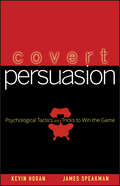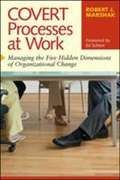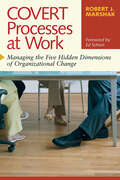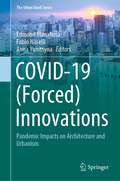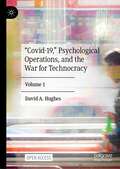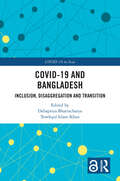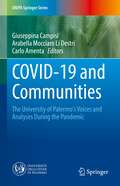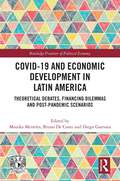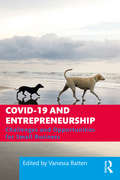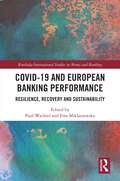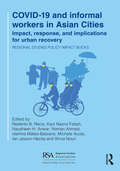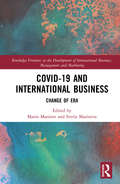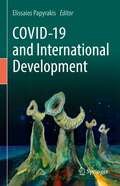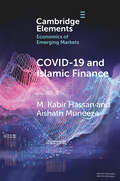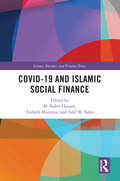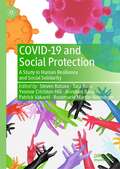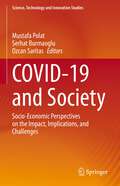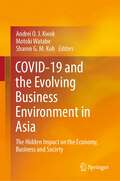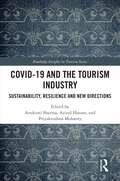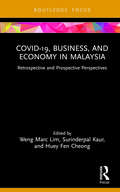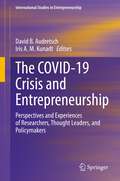- Table View
- List View
Covered Calls and LEAPS--A Wealth Option + DVD
by Robert Kiyosaki Joseph R. Hooper Aaron R. ZalewskiIn this one-of-a-kind "how-to" guide, Joseph Hooper and Aaron Zalewski provide step-by-step instructions for generating large monthly cash returns from almost any stock investment--while at the same time decreasing the risk of stock ownership. Filled with in-depth insights and proven techniques, this book is the definitive, rule-based guide to covered calls and calendar LEAPS spreads.
Covert Cows and Chick-fil-A: How Faith, Cows, and Chicken Built an Iconic Brand
by Steve RobinsonThe longtime chief marketing officer for Chick-fil-A tells the inside story of how the company turned prevailing theories of fast-food marketing upside down and built one of the most successful and beloved brands in America.Covert Cows will help you… Discover unexpected, out-of-the-box marketing methods and new ways of approaching business problems.Understand the positive impact of building a business based on biblical principles.Receive an insider&’s look at the evolution of one of America&’s most beloved brands.Learn key marketing and business insights from the man who was the chief marketing officer for Chick-fil-A for thirty-four years.During his thirty-four-year tenure at Chick-fil-A, Steve Robinson was integrally involved in the company&’s growth--from 184 stores and $100 million in annual sales in 1981 to over 2,100 stores and over $6.8 billion in annual sales in 2015--and was a first-hand witness to its evolution as an indelible global brand. In Covert Cows and Chick-fil-A, Robinson shares behind-the-scenes accounts of key moments, including the creation of the Chick-fil-A corporate purpose and the formation and management of the now-iconic "Eat Mor Chikin" cow campaign. Drawing on his personal interactions with the gifted team of company leaders, restaurant operators, and the company's founder, Truett Cathy, Robinson explains the important traits that built the company's culture and sustained it through recession and many other challenges. He also reveals how every aspect of the company's approach reflects an unwavering dedication to Christian values and to the individual customer experience. Written with disarming candor and revealing storytelling, Covert Cows and Chick-fil-A is the never-before-told story of a great American success.
Covert Persuasion: Psychological Tactics and Tricks to Win the Game
by Kevin Hogan James SpeakmanDiscover effective techniques to convince people of virtually anything with the help of psychology, linguistics, sales tactics & communication.&“This book is a treasure trove of ideas you can use to turn a &‘no&’ into a &‘yes&’ almost instantly-in any sales situation.&” —Brian Tracy, speaker and author of Create Your Own Future and Change Your Thinking, Change Your Life When we make decisions we like to think we weight the options carefully, look at all the possibilities, and make the best choice based on a rational examination of the facts. But in truth, much of our decision making happens on a subconscious level based on feelings we might not even be aware of. Understanding and managing those subconscious feelings is the key part to persuasion. By observing and predicting human behavior, we can learn to react and direct behavior in others with the right kinds of words and body language. If you want to learn how to convince people to buy your product, contribute to your cause, or vote for your candidate, this book has the answers. Covert Persuasion synthesizes the latest research in psychology, linguistics, sales tactics, human communication to reveal the most effective methods for consistently and effectively persuading anyone of virtually anything. Covert Persuasion sounds like a secret operation because it is; when you master these techniques you can use every day to dramatically increase your commissions. And if you don&’t work in sales, you can still use these tactics to convince colleagues, subordinates, and supervisors to help you meet your goals and get things done daily. Even outside the office, persuasion is a vital skill everyone should have. This reliable resource will help you with all your persuasion efforts, in every situation. Dip into it for fresh ideas and new techniques or use it to sharpen the skills you already have. For salespeople, Covert Persuasion will help you increase your sales almost immediately. No matter what you do for a living, this book will help you do it better. Not convinced yet? Look inside and you will be . . . &“Hogan is the master of persuasion. I urge you to persuade yourself to buy this book and everything he&’s ever written and recorded. It will help you understand yourself, understand others, and succeed. This information is bankable.&” —Jeffrey Gitomer, author of The Sales Bible, Little Red Book of Selling, and Little Red Book of Sales Answers
Covert Processes at Work: Managing the Five Hidden Dimensions of Organizational Change
by Robert J. MarshakThe first and only guidebook that specifically outlines methodologies for diagnosing and dealing with all of the "hidden" or covert factors that can subtly sabotage even the most meticulously planned change processes.
Covert Processes at Work: Managing the Five Hidden Dimensions of Organizational Change
by Robert J. MarshakOrganizational change initiatives often fail because they focus exclusively on the rational, overt aspects of change, overlooking the powerful role played by concealed or irrational factors. It's well known that these covert processes--such as hidden agendas, blind spots, office politics, tacit assumptions, secret hopes, wishes and fears--frequently sabotage change efforts, but up until now nobody has offered a rigorous, consistent way of identifying and dealing with them. Drawing on over thirty years of experience as an organizational change consultant to global corporations and government agencies, Robert J. Marshak shows precisely how to bring these hidden processes to light and deal with their negative impact. Marshak identifies five different dimensions of covert processes, presents an integrated model to explain the ultimate source of all of them, and shows how to diagnose whether any covert processes might be at work in your organization. He then offers specific tools and techniques for engaging and managing these "under-the-table" processes and for creating the kind of organizational environment in which such hidden dynamics are unable to flourish. Covert Processes at Work is a comprehensive and practical guide that managers, leaders, and consultants can use to deal with the hidden dynamics that are often at the root of many organizational problems.
COVID-19: Pandemic Impacts on Architecture and Urbanism (The Urban Book Series)
by Anna Yunitsyna Edmond Manahasa Fabio NaselliThis book gives an overview of the shifting paradigm from traditional design techniques and standards to new values and methods that occurred in response to confronting the COVID-19 pandemic. The theoretical studies of the phenomenon of "new normality" in architecture, urbanism and social sciences are a source of knowledge for researchers, professors and students in the fields of architecture, urbanism and interior design. On-site applications of post-COVID-19 structures will be interesting for students, practitioners, developers and city managers. The issue of online design teaching and learning provides a set of practices that can be applied by both educators and trainees. The book also is useful for readers who are interested in recent trends in architecture and interior design: it provides a deep analysis of recent changes in architecture, which aim to make the environment disease-free and the space habitable during the long periods of lockdown.
“Covid-19,” Psychological Operations, and the War for Technocracy: Volume 1
by David A. HughesCamouflaged by “Covid-19,” an undeclared global class war was initiated in 2020, aimed at replacing liberal democracy with technocracy, a novel, biodigital form of totalitarianism. The opening campaign involved the largest psychological operation in history, intended to demoralise, disorientate, and debilitate the public. This volume deals with the application of shock and stress, trauma-based mind control, the use of fear and threat, cognitive attack, weaponised deception, and techniques for turning society against itself. This is an open access book.
COVID-19 and Bangladesh: Inclusion, Disaggregation and Transition (COVID-19 in Asia)
by Debapriya Bhattacharya and Towfiqul Islam KhanCOVID-19 and Bangladesh analyzes the aftermath of the COVID-19 pandemic and features the socioeconomic fallouts for disadvantaged communities in Bangladesh, their coping mechanisms, and implications for the country’s development ambitions.The contributors to the book examine the immediate impact of economic adversities, which rapidly translated into health, employment, education, and other socioeconomic problems. They show that the pandemic has disproportionately impacted the communities that were traditionally left behind and created a new group of people that are “pushed behind”. Structured in four sections, the book examines impact and adjustment in the areas of employment, income, and expenditure and health, education, and the Sustainable Development Goals (SDGs) and offers policy perspectives. The empirical analysis and policy conclusions presented in the chapters are based on official secondary data, household-level primary surveys, focus-group discussions, key informant interviews, and reviews of public policy documents. The policy conclusions and outlook presented in the book can be instructive for other low-middle income, or graduating least developed countries (LDC).A unique contribution to the current debate on the diverse implications of the COVID-19 pandemic, this book will be of interest to policymakers and academics studying health and society in Asia and other countries of the Global South.
COVID-19 and Communities: The University of Palermo's Voices and Analyses During the Pandemic (UNIPA Springer Series)
by Giuseppina Campisi Arabella Mocciaro Li Destri Carlo AmentaThis volume presents an interdisciplinary reflection on the SARS-COV-2 pandemic and its consequences elaborated in real-time. It embodies the University of Palermo’s values and mission by bringing together academics of very diverse disciplinary fields on an issue that is disrupting all aspects of individual and community existence. This volume captures the voices of academics during the pandemic, allowing to crystallize the discourses that are emerging in a wide variety of scientific fields as events unfold and knowledge is rapidly evolving. They share the belief that to shed adequate light on the complex and multifaceted phenomenon of the COVID-19 pandemic and its consequences necessarily requires the adoption of an interdisciplinary approach, the consideration of a multiplicity of perspectives, and of a variety of levels of analysis. The organization of the single contributions in chapters allows the exchange of different perspectives, whilst conveying a general overall framework to the interpretation of the many facets of the changes and crisis generated by COVID-19.The volume addresses both academics and professionals dealing with the processes and the consequences brought forth by the pandemic and presents a solid example of the commitment an academic institution should devote to society and communities.
COVID-19 and Economic Development in Latin America: Theoretical Debates, Financing Dilemmas and Post-Pandemic Scenarios (Routledge Frontiers of Political Economy)
by Monika Meireles Bruno De Conti Diego GuevaraThe impact of the COVID-19 pandemic on the global economy, just as with the Great Recession a decade earlier, has served to reinforce the fact that the world is hierarchically organized and the distribution of power between countries is distinctly asymmetric. Gathering multiple viewpoints of Latin American researchers, this book explores the impacts of the pandemic, including unequal access to vaccines and recovery finance, on economies in the region. The book is organised in three substantial sections: the first brings together conceptual work which rethinks the fundamental categories for critical thinking on the challenges for Latin American development in a post-pandemic scenario. In the second part, the chapters focus on studying the Latin American financial reconfiguration that is being driven by the pandemic, particularly through a comparison of the experience of countries of the world economy’s core and periphery. Finally, the third part evaluates the concrete experiences of different Latin American countries in this very specific historical moment, emphatically analyzing the economic policy responses that the governments are adopting to deal with the current sanitary emergency and its economic and social effects. From this, the book suggests keystone elements for the relaunch of development strategies in the region as it recovers from the pandemic. This book will be of particular interest to readers of critical or heterodox perspectives on the economics of the pandemic, Latin American development and emerging economies.
COVID-19 and Entrepreneurship: Challenges and Opportunities for Small Business
by Vanessa RattenAmid the COVID-19 pandemic, small businesses are especially vulnerable. This is one of the first books that explicitly examines the linkage between crisis and entrepreneurship with a specific focus on small businesses. The book adopts a holistic approach and outlines strategies that small business owners can utilize as well as business opportunities that are available in these new market conditions. It also provides a comparative analysis of the current and future market conditions to enable a better understanding of how institutional structures can facilitate or hinder growth. The book also goes on to explain why and how creativity and innovation can help to mitigate the impact of such a crisis on business and highlights why business continuity is especially crucial to family-owned businesses. This timely publication will help to guide small business owners and entrepreneurs to maintain business continuity and build up their resilience in a challenging business climate.
COVID-19 and European Banking Performance: Resilience, Recovery and Sustainability (Routledge International Studies in Money and Banking)
by Paul Wachtel Ewa MiklaszewskaThe monograph presents a comprehensive analysis of the impact of the COVID-19 pandemic on European banking, both at a macro and a micro level. It analyses the impact of the pandemic on bank stability, performance and credit policies, as well as their strategic adjustments to the challenges brought about by the COVID-19 pandemic. The initial chapters analyze the various governmental responses to the pandemic. Topics of discussion include the scale and scope of the wide range of public policies undertaken to mitigate the consequences of the crisis, and their efficiency in limiting the negative impact of the pandemic on the economy. The results suggest that the extensive public interventions have been largely successful in averting the possible disastrous consequences for the financial sector on a macro level. On a micro level, the COVID-19 pandemic has disrupted the restructuring and recovery of the banking industry started after the 2008 crisis which has had a significant impact on economies around the world, arguably leading to a negative long-lasting effect on sustainable development. To examine this, the book focuses on the impact of the pandemic on bank lending policies, bank stability and performance, and on competitive position of the banks vis a vis the FinTech sector. Offering a thorough overview of the issues that banks will have to face as a consequence of pandemic related macroeconomic and industry adjustments, the book will be of interest to scholars, researchers and students of banking and finance as well as banking specialists concerned with the impact of crises on financial markets, risks and resilience.
COVID-19 and informal workers in Asian cities: Impact, response, and implications for urban recovery (Regional Studies Policy Impact Books)
by Redento B. Recio Kazi Nazrul Fattah Nausheen H. Anwar Noman Ahmed Iderlina Mateo-Babiano Michele Acuto Ian Jayson Hecita Shiva NouriAs COVID-19 took hold across local and international borders in 2020 and 2021, over 1.6 billion informal workers were estimated to have been adversely impacted by mobility restrictions and other 'lockdown' measures to tackle the coronavirus crisis. In the Global South, the pandemic has severely affected the sprawling megacities in Southeast and South Asia that have been driving urbanisation, and where there is a very high concentration of informal workers. This volume examines how informal workers were affected by the responses to the pandemic in five Asian megacities: Dhaka (Bangladesh), Hyderabad (India), Karachi (Pakistan), Jakarta (Indonesia), and Manila (Philippines). Gathering voices and experiences from across these subregions, this book engages with issues surrounding state measures to manage the COVID-19 pandemic. The chapters present the gaps and lessons learned in addressing the needs of informal workers. They also shed light on grassroots solidarity initiatives, civic practices, and social networks that have cushioned the devastating effects of the crisis. The book ends with a discussion on the implications of identified state measures and citizen-led responses for (post) pandemic planning and urban governance in Asian cities in an age of recovery.
Covid-19 and Insurance (AIDA Europe Research Series on Insurance Law and Regulation #7)
by María Luisa Muñoz Paredes Anna TarasiukThis book offers a novel study on the impact of the Covid-19 pandemic on insurance from an international and comparative perspective. It assesses how insurance has to adapt to a new landscape, the effects of which will last over time and cut across all areas of the field. To avoid physical contact, digitalisation has accelerated dramatically, affecting insurance in all its phases: risk selection, underwriting, pricing and claims settlement. However, the effects of the Covid-19 pandemic go far beyond that. The extent to which a claim caused directly or indirectly by the virus is or is not covered by a given policy has been the subject of debate in many insurance branches. The most litigated cases worldwide are those that concern damages resulting from business interruption due to restrictions enforced by the authorities in virtually every country. This book analyses the rulings (for and against the insured) that have already been handed down by courts in various jurisdictions (for example in the US, Latin America, Spain and Germany), in order to provide guidance to the parties in future lawsuits and also to guide the courts’ own responses. This analysis extends to the measures that governments have taken in relation to insurance during the pandemic, as well as the changes that insurers have introduced in their general conditions to exclude coverage for the pandemic. This response is unsatisfactory, as the big question is how pandemic-related risks can be covered if private insurers simply refuse to do so. Solutions based on risk sharing with public entities or the use of contractual modalities such as parametric insurance are among those outlined by the authors. The book was written by experts from academia and lawyers specialising in this field, and written for all those interested in the field of insurance: lawyers, judges, academics and legal professionals.
Covid-19 and International Business: Change of Era (Routledge Frontiers in the Development of International Business, Management and Marketing)
by Marin A. Marinov Svetla T. MarinovaThe Covid-19 pandemic has induced a crisis grasping the world abruptly, simultaneously, and swiftly. As a critical juncture, it ignited a change of era for international business. This book illustrates how governments have dealt with the pandemic and the consequent impacts on international business. It also explores the disrupted operations and responses of businesses as their worldwide interconnectivity has been seriously threatened. The book discourses multidirectional aspects of the effects of Covid-19 on international business, ranging from the juxtaposing forces disrupting globalization and installing a change of era through decoupling of technological, production and knowledge flows to its stimulating aspects to the strategic response on business, industry and state level. The book contains thirty chapters that offer a multidimensional interpretation of impacts of Covid-19 on international business theory and practice. Employing the latest state of knowledge on the topic, the book is aimed at international business audience - scholars, students and managers who need to understand better the nature, scope and scale of the impacts of the pandemic on international business.
Covid-19 and International Business: Change of Era (Routledge Frontiers in the Development of International Business, Management and Marketing)
by Marin A. Marinov Svetla T. MarinovaThe Covid-19 pandemic has induced a crisis grasping the world abruptly, simultaneously, and swiftly. As a critical juncture, it ignited a change of era for international business. This book illustrates how governments have dealt with the pandemic and the consequent impacts on international business. It also explores the disrupted operations and responses of businesses as their worldwide interconnectivity has been seriously threatened. The book discourses multidirectional aspects of the effects of Covid-19 on international business, ranging from the juxtaposing forces disrupting globalization and installing a change of era through decoupling of technological, production and knowledge flows to its stimulating aspects to the strategic response on business, industry and state level. The book contains thirty chapters that offer a multidimensional interpretation of impacts of Covid-19 on international business theory and practice. Employing the latest state of knowledge on the topic, the book is aimed at international business audience - scholars, students and managers who need to understand better the nature, scope and scale of the impacts of the pandemic on international business.
COVID-19 and International Development
by Elissaios PapyrakisThe current coronavirus pandemic fundamentally reshapes existing debates and processes in international development. The unprecedented (and rapidly evolving) crisis is generating a number of substantial challenges for developing economies. Governments in low-income nations often find it extremely hard to cope with the increased demand for health services, make prompt decisions and put them into action, protect vulnerable segments of society and offer immediate relief to affected economic sectors. This book provides a series of reflective chapters that demonstrate how several areas of international development have been severely affected by the Covid-19 outbreak. It provides an in-depth critical discussion on how the current pandemic influences several development outcomes (in the domains of poverty/inequality, health, education, migration, formal/informal employment, (de)globalisation, the extractive sector, climate change, water and the global financial system). Each chapter draws policy recommendations on relevant interventions that can alleviate the identified negative repercussions of the Covid-19 pandemic, especially for the most vulnerable communities in the Global South.
COVID-19 and Islamic Finance (Elements in the Economics of Emerging Markets)
by M. Kabir Hassan Aishath MuneezaThe objective of this Element is to provide an overview of Islamic finance by highlighting the impact of the pandemic on it in a comprehensive manner by looking at two branches of Islamic finance: Islamic commercial finance; and Islamic social finance. The approach that is adopted in this Element is to first provide an overview of Islamic finance to the readers in a simple and easy manner followed by the impact of pandemic discussed separately for both types of Islamic finance. Last, but not least, the Element also recommends ways in which Islamic finance could be further improved in the light of the lessons learnt from the pandemic. It is anticipated that the recommendations made in this regard would assist policymakers, practitioners, researchers and other stakeholders of Islamic finance to understand the way to unlock the full potential of Islamic finance to reduce the wealth gap and achieve financial inclusion.
COVID-19 and Islamic Social Finance (Islamic Business and Finance Series)
by M. Kabir Hassan, Aishath Muneeza, and Adel M. SareaIt is said that the COVID-19 pandemic has turned back the poverty clock. As such, there is a need to have social mechanisms put in place to provide relief to those who are affected in this regard. Islamic social finance consists of tools and institutions that could be used to alleviate poverty. This book explores the impact of COVID-19 on Islamic finance to better understand the effectiveness of Islamic social finance in helping those who have been affected by poverty overnight due to the halt in all major economic activities in the context of the pandemic. Since the struggle against poverty in each country will be different, the book attempts to shed light on the experiences of different countries by presenting successful models of Islamic social finance. The book first looks at poverty and COVID-19 before delving into the role of Islamic social financial institutions and how they have risen against COVID-19. The book concludes by examining the impact of COVID-19 on Islamic microfinance. This book is the first of its kind on the subject of COVID-19, and it intends to bridge the gap in the literature.
COVID-19 and Social Protection: A Study in Human Resilience and Social Solidarity
by Yvonne Crichton-Hill Tara Ross Patrick Vakaoti Steven Ratuva Arindam Basu Rosemarie Martin-NeuningerThis book provides a comparative analysis of how communities have developed people-based resilience in response to the global impact of COVID-19. The crisis of the capitalist economy due to border closure, downturn in business, loss of jobs and large-scale destruction of people’s well-being has worsened poverty, and inequality worsened the situation of the already marginalized. At the same time, it has provided the opportunity for indigenous and marginalized communities to innovatively strengthen their social and solidarity economies to respond the unprecedented calamity in a self-empowering and sustainable way. The book explores some of the ways in which local communities have mobilized their cultural resources to strengthen their social solidarity and mitigating mechanisms against the continuing global calamity. It looks at how different communities approach social protection as a way of sustaining their well-being outside the parameters of the ailing market economy and how some of these can provide valuable lessons for strengthening resilience for the future.
COVID-19 and Society: Socio-Economic Perspectives on the Impact, Implications, and Challenges (Science, Technology and Innovation Studies)
by Ozcan Saritas Mustafa Polat Serhat BurmaogluThis timely book presents a collection of expert insights into the impacts of COVID-19 in a broader socio-economic context. In each chapter, the authors identify the current impact of COVID-19 by demonstrating transformative signals and project these signals to the future by considering their alternative futures and implications. The book emphasizes that dealing with major global pandemics like COVID-19 requires all countries and regions to take different, but synchronized measures to decrease its socio-economic effects in the short, medium and long run. The consequences of COVID-19 will go beyond medicine to cover all other aspects of life and are bound to change the nature of organizations. Moving beyond the medical viewpoint, the experts in this book discuss the topic from multi-dimensional and multi-disciplinary angles by focusing on the domains of technology, business, finance, marketing, law, public administration, and education.
COVID-19 and the Evolving Business Environment in Asia: The Hidden Impact on the Economy, Business and Society
by Motoki Watabe Andrei O. J. Kwok Sharon G. M. KohThis book brings together valuable insights about the impact of the COVID-19 pandemic on the business environment from an Asian perspective. While some businesses in Asia have been swift to embrace the new normal, others have found the disruption to the traditional way of doing business challenging. Businesses are striving to respond, adapt, and thrive under the shadow of the unprecedented upheaval to the business environment that has forced them to rethink their strategies, processes, and operating models. There seems to be a consensus among business scholars and stakeholders that the continuous embrace of change and transformation of business models will assist businesses to sustain a long-term competitive advantage. The chapters in this book explore shifts in business innovation and strategies linked to the “new normal” of doing business during the pandemic, bringing to light issues, challenges, and opportunities that firms can expect to face in their need to ensure sustainability post-pandemic and beyond.
COVID-19 and the Tourism Industry: Sustainability, Resilience and New Directions (Routledge Insights in Tourism Series)
by Anukrati SharmaThis book offers international perspectives on the economic, social, geopolitical, and environmental implications of COVID-19 on tourism, an unprecedented situation for this sector. It considers the challenge of making the tourism industry more resilient to such crises and the future sustainability of tourism. Contributions explore the changing dimensions of tourism marketing post-COVID-19; the rising challenges in tourism education and ways to handle the crisis; the impact of the pandemic on tourism governance; and the emerging ethical issues of stakeholders’ responsibility. The book will be useful for researchers, students, and practitioners in the fields of tourism, geography, and crisis management disciplines.
COVID-19, Business, and Economy in Malaysia: Retrospective and Prospective Perspectives (COVID-19 in Asia)
by Weng Marc LimPart of a mini-series of Focus books on COVID-19 in Malaysia, the chapters in this book address the pandemic’s impact on business and the economy in Malaysia. Covering a range of challenges and opportunities for business and the economy over a year-long period, starting from Malaysia’s first pandemic lockdown in March 2020 to the state of the country as of May 1, 2021, the contributors highlight the impact of the pandemic on the Malaysian business and economy and how Malaysians are finding ways to adapt and rise above adversity. They illustrate how the pandemic has affected businesses and anticipate the prospects for the Malaysian economy going forward. This is also an opportunity to witness how researchers from multiple disciplines can join forces during challenging times to deliver insightful research with impact. More importantly, there are many lessons to be learned from the successes and failures in responding to the pandemic in this developing Southeast Asian economy. A fascinating read for individuals with an interest in crisis adaptation in non-Western contexts, especially those with a particular interest in Malaysia or Southeast Asia more generally.
The COVID-19 Crisis and Entrepreneurship: Perspectives and Experiences of Researchers, Thought Leaders, and Policymakers (International Studies in Entrepreneurship #54)
by David B. Audretsch Iris A. M. Kunadt2020 introduced a global pandemic that led to global economic, social, and regional lockdowns affecting public life in ways never been imagined before. This book takes a look at how researchers from fields encompassing economics and political science, along with thought leaders in business and economic policy, experienced the crises themselves as experts in their field, as well as from a personal viewpoint. Most importantly, however, it looks into the future how entrepreneurship and economic policies may change and positively influence the societies and the economy after the pandemic. Keeping in mind that, with climate change and the digital revolution, change was already around the corner and inevitable, renowned economic and policy experts are asked for their assessment of future roads and feasible economic policies. The book follows the chronology of the pandemic and focuses on leading researchers and thought leaders in public policy and business. An introduction to each chapter describes the context particular to the contributing author when the pandemic struck and their own reactions, experiences, and insights triggered by the emerging pandemic.


